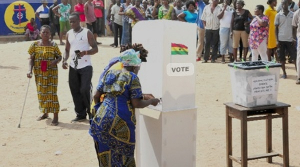- Home - News
- TWI News | TV
- Polls
- Year In Review
- News Archive
- Crime & Punishment
- Politics
- Regional
- Editorial
- Health
- Ghanaians Abroad
- Tabloid
- Africa
- Religion
- Election 2020
- Coronavirus
- News Videos | TV
- Photo Archives
- News Headlines
- Press Release
Regional News of Tuesday, 25 April 2006
Source: GNA
RCC will get tough with saboteurs of development projects-Edumadze
Cape Coast, April 25, GNA - Mr Isaac Edumadze, the Central Regional Minister, on Tuesday said the Regional Coordinating Council (RCC) would not tolerate districts that might prove difficult in the implementation of projects.
He expressed concern that the implementation of micro-projects that involved the provision of classroom blocks, places of convenience, markets, roads, rural clinics and boreholes in the region had been "bedevilled by numerous obstacles".
These, he said, included administrative bottlenecks and lukewarm attitudes by some participating district assemblies and communities, non-transparency in the recruitment of artisans by officials of the assemblies and misconception about the projects by some local stakeholders.
Mr Edumadze said this at the launch of the sixth European Union (EU) micro-projects programme (MPP) that is expected to take off in June and 'regional information and education campaign' for the region, in Cape Coast.
District Chief executives, District Coordinating directors and heads of department attended it. The region has, since the launch of the fifth MMP in 1996, benefited from a total of 330 projects in all the 13 districts at an approximate cost of 31 billion cedis. The EU contributed 25 billion cedis of the amount representing 75 per cent, with the assemblies and beneficiary communities contributing the balance of 25 per cent.
Mr Edumadze expressed gratitude to the EU and stressed the importance of such projects in complementing government's efforts at poverty alleviation.
He expressed unhappiness that some of the completed facilities were still not being utilized despite their urgent need and relevance to the beneficiary communities and said the situation was "unacceptable". "We will have no justification to ask for more projects when we have failed to make good use of what is available to us," he said and tasked the assemblies to ensure that all completed projects are fully utilized by the communities.
He told the participants that it was therefore imperative for them to seriously reflect on the implementation strategy of the fifth MMP and "draw some useful lessons that will guide" the implementation of the sixth MMP.
Mr Edumadze said the monitoring and evaluation unit of the RCC had been strengthened to monitor all such projects and that defaulting municipal and district assemblies and agencies, would face sanctions. He gave the assurance that an award scheme would be evolved to honour hardworking assemblies whose contributions impact positively on the lives of the people.
Mr Kwadwo Baah-Wiredu, the Minister of Finance and Economic Planning, said in an address read on his behalf that such projects were important for the government's Growth and Poverty Reduction Strategy (GPRS).
He said the Upper East, Upper West, Western, Eastern, Northern and Volta regions have been selected alongside the Central Region to as core beneficiaries of the sixth MMP, "as a result of pockets of poverty identified in these regions". The minister said 25 million Euros have been allocated for the Sixth MPP, following the successful implementation of earlier EU supported projects.
Mr Baah-Wiredu said the government of Ghana/EU Country Strategy Paper/ National Indicative Programme (CSP/NIP) that "gave birth to the MPP was based on the overall national strategy and reflects the general principles of achieving sustainable macroeconomic stability and accelerated growth.'' He said since the inception of EU projects in the country in 1990, with a total allocation of 50.1 million Euros from the European Development Fund (EDF), the MPP had provided a total of 3,700 projects nationwide.
He also expressed his profound gratitude to the EU for its assistance to the country and that the implementation of the sixth MPP has a "new concept and focus" of providing income-generating ventures to help solve the unemployment problem, curb the rural- urban drift and the crime wave.










